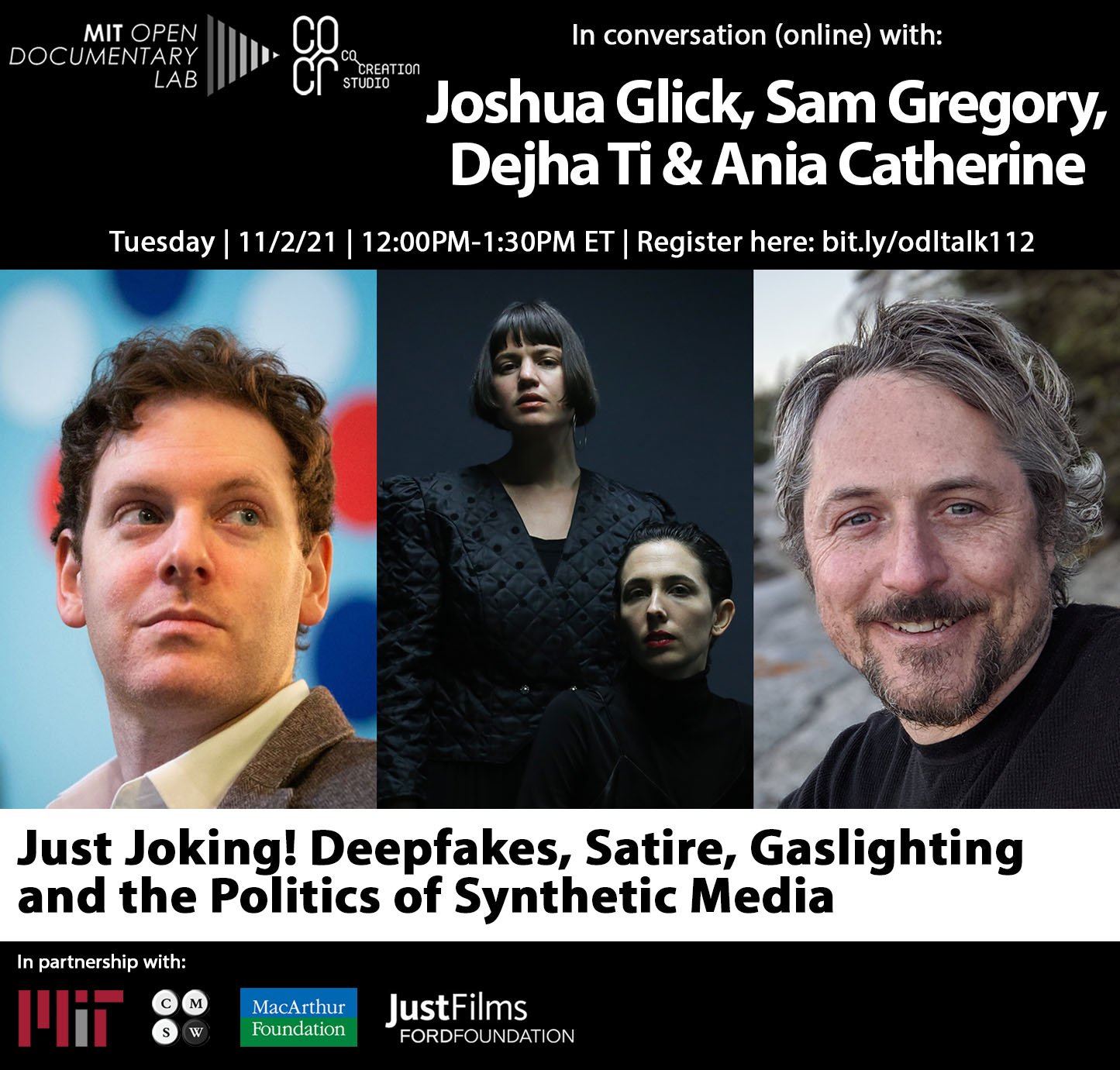MIT Open Doc Lab conversation
Dejha Ti and Ania Catherine were invited to participate in an MIT Open Documentary Lab / Co-Creation Studio conversation about synthetic media, specifically presenting about their latest work Soft Evidence.
Just Joking! Deepfakes, Satire, Gaslighting and the Politics of Synthetic Media
With deepfakes, who decides what’s funny, what’s fair, and who is accountable? This will be an interactive, highly visual panel discussion on deepfakes’ growing use in satire and activism around the world, from mocking authoritarian leaders to synthetically resurrecting victims of injustice to demand action. These often controversial uses of synthetic media raise critical questions. How can we distinguish intentional disinformation or gaslighting attack from clumsy deepfake critique? Who’s fair game to mimic without consent? We’ll provide a sneak peak at findings from the upcoming Just Joking! report, a collaboration between Co-Creation Studio at MIT Open Doc Lab and the human rights, video and technology network WITNESS. In this session moderated by Co-Creation Studio’s Kat Cizek, we’ll highlight the report’s critical questions and discussions based on an analysis of over 70 recent uses of deepfakes using satire and beyond. This work is grounded in the ongoing Deepfakery collaboration between Co-Creation Studio and WITNESS, as well as WITNESS’s ‘Prepare, Don’t Panic’ initiative.
PARTICIPANTS
Joshua Glick is the Isabelle Peregrin Assistant Professor of English, Film & Media Studies at Hendrix College and a Fellow at the Open Documentary Lab at MIT. His book, Los Angeles Documentary and the Production of Public History, was published by the University of California Press. In collaboration with The MIT Center for Advanced Virtuality, Dr. Glick recently designed the online curriculum, “Media Literacy in the Age of Deepfakes.” He is currently co-editing The Oxford Handbook of Documentary with Dr. Patricia Aufderheide that brings scholars and practitioners into dialogue about the ethics and craft of social justice filmmaking.
Sam Gregory is an award-winning technologist, media-maker, and advocate, and Program Director of the global human rights network WITNESS which helps people use video and technology to defend human rights. An expert on new forms of misinformation and disinformation as well as innovations in preserving trust, authenticity and evidence in an era of increasing audiovisual communication and smartphone witnessing, he leads WITNESS’s global ‘Prepare, Don’t Panic’ initiative. In coordination with technical researchers, policy-makers, companies, media organizations, journalists and civic activists, this initiative aims to build better globally-inclusive preparedness for malicious usages of synthetic media including current work on deepfake detection equity, deepfake ethics and satire, and emerging standards in authenticity infrastructure.
Dejha Ti and Ania Catherine are a Los Angeles-based experiential artist duo. Referred to as “the two critical contemporary voices on digital art’s international stages” (Clot Magazine) and “LGBT power couple” (Flaunt), the duo is known for their signature poetic approach to technology. Both conceptual artists, their expertise collide through their collaborative practice merging environments, technology, and performance—Ti with an extensive background in immersive art and human-computer interaction (HCI), and Catherine a recognized choreographer, performance artist and London School of Economics gender scholar. They’ve been featured on BBC Click, Bloomberg ART+TECHNOLOGY, Christie’s Art+Tech Summit, SXSW, Ars Electronica, as well as recognized by the Lumen Prize, S+T+ARTS Prize, and ADC Awards.



